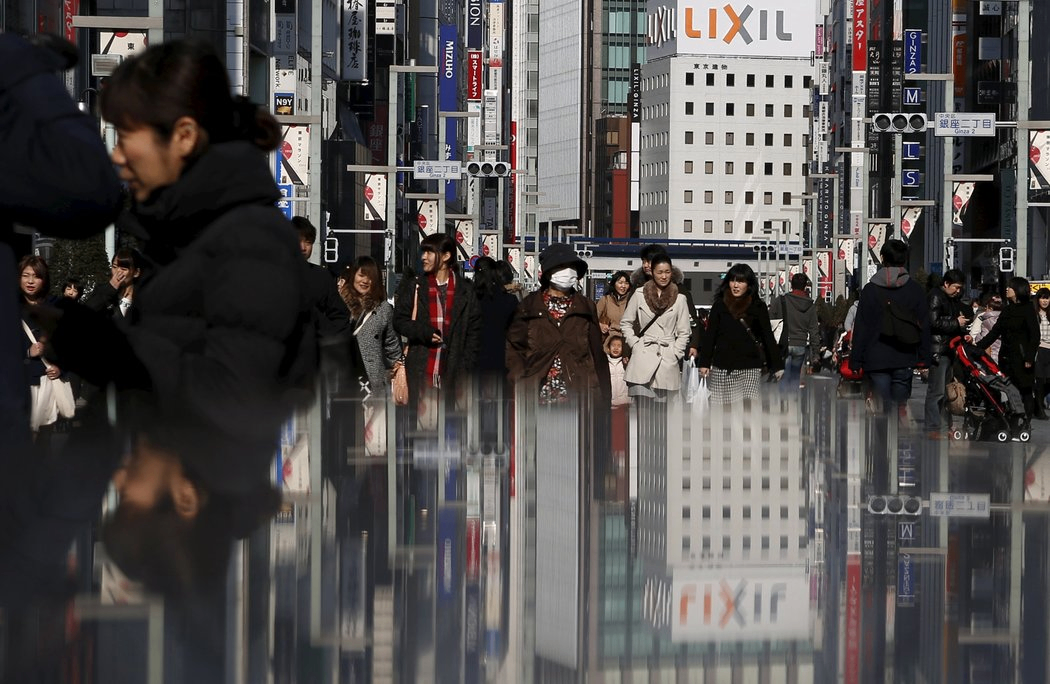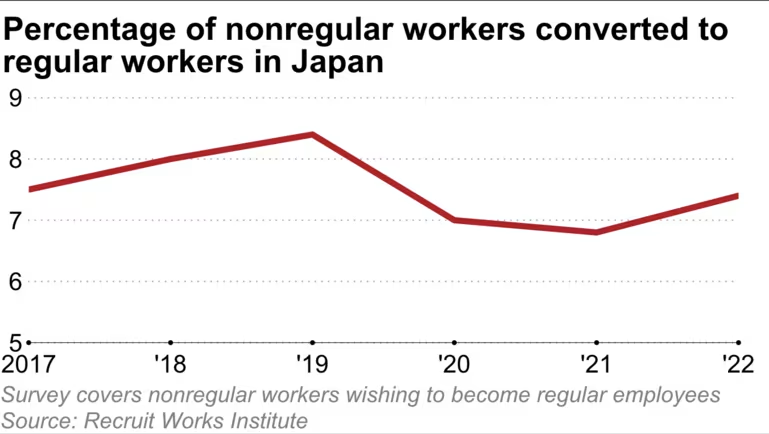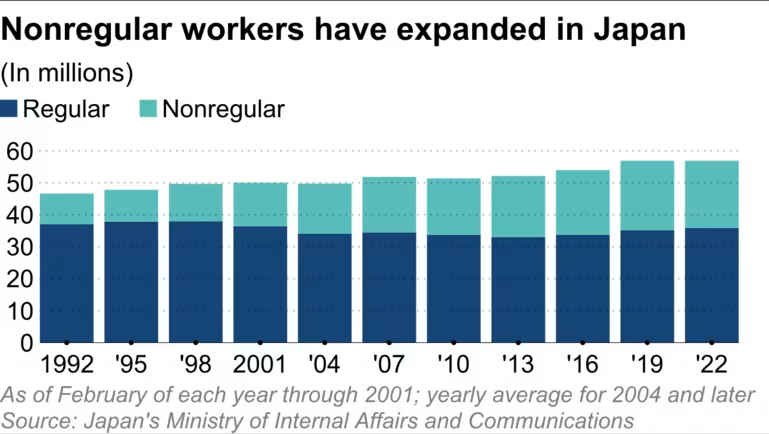Labor Shortages Clouded Japan Still Sets Too High a Threshold for Full-Time Jobs
In labor-scarce Japan, informal workers struggle to become full-time employees。In 2022, only 7.4% of fixed-term employees found stable jobs。
Although Japan's labor shortage is deepening, many temporary and part-time workers in the country are still struggling to find full-time jobs。
According to statistics, in 2022, Japan has only 7.Four per cent of informal workers (those sent by talent agencies or employed on short-term contracts) have found full-time employment, which, coupled with the large wage gap between regular and informal employees, has depressed the country's overall wage levels.。

Compared to temporary and part-time work, full-time work certainly has higher pay, better benefits, more comprehensive vocational training, etc., but the reality is that informal employees face obstacles in finding full-time work。
A 32-year-old part-time employee in Saitama Prefecture, north of Tokyo, said he had been asked by a recruiter to accept a lower salary than advertised for his part-time status during an interview。
The employee is understood to have worked for a social insurance and labor consulting firm and had to look for a full-time job in order to afford his children's education.。She applied to more than 20 companies and eventually received a temporary offer of employment from another consulting firm。The real salary for the new job is 180,000 yen (about $1,200) a month, 70,000 yen more than the previous job, and there are seasonal bonuses.。
Thus, for informal workers, the threshold for finding a full-time job remains high。

A survey by the Recruit Works Institute revealed that many part-time and temporary workers are eager to find full-time jobs, but only 7 in 2022..4% achieved this goal.。That number has remained largely unchanged since the survey began in 2016.。
According to the Ministry of Internal Affairs and Communications, the total number of informal employees in the country in 2022 was 21.01 million, an increase of 260,000 from the previous year.。Of these, the number of regular employees increased by only 10,000, with informal employees accounting for 36% of the workforce..9%, 3% higher than in 2009.2 percentage points, at the time of the global financial crisis, many short-term employees were laid off。
Currently, Japanese companies still face a shortage of full-time employees。According to a 2023 survey by Teikoku Databank, 52% of companies report a shortage of regular employees, the second highest number on record.。Japan's employment agency En Japan says the number of regular employees who change jobs through online channels quadrupled in the five years to 2022。
In fiscal 2013, the Japanese government introduced a subsidy program to encourage businesses to provide full-time jobs for informal employees; in fiscal 2023, the government provided 570,000 yen for each status change for small businesses and 420,000 yen for large businesses.。By the end of fiscal 2022, subsidies had helped 780,000 workers gain full-time status.。
A revision of the labor contract law also played a role, requiring companies to convert informal employees who have worked continuously for at least five years to regular employees, but the impact has been limited。
Emiko Takeishi, a professor of human resources management at Hosei University in Japan, said: "Companies prefer employees who can make an immediate contribution, but employers' high expectations also raise the threshold for informal employees to get full-time positions.。"

Short-term workers are at a very disadvantage in terms of vocational training。Because in addition to more objective compensation and benefits, companies tend to provide training only to regular employees.。Many informal employees are unable to meet the requirements for skills and knowledge when they expect some changes in the middle of their careers。
Some married employees even choose to continue working part-time because they want to keep their income below a certain level and thus get tax-free treatment.。
In Japan, the pay gap between regular and informal employees is large。According to a survey by the Ministry of Labour and Eurostat, in the 2010s, the average hourly wage of an informal or fixed-term employee in Japan was equivalent to 65 per cent of that of a regular employee, well below the 85 per cent in the UK and 74 per cent in Germany, with the huge gap causing the overall wage level in Japan to fall to the lowest level among the G7 developed economies.。
Today, while wages in Japan have begun to rise, the government still needs to enforce equal pay policies for equal work.。Otherwise, the increase in overall wages will not narrow the income gap, but will exacerbate the inequality between the rich and the poor in society.。
In addition, the public and private sectors must work together to develop job training programmes to keep informal employees up to date on the latest business and technology trends.。
·Original
Disclaimer: The views in this article are from the original Creator and do not represent the views or position of Hawk Insight. The content of the article is for reference, communication and learning only, and does not constitute investment advice. If it involves copyright issues, please contact us for deletion.